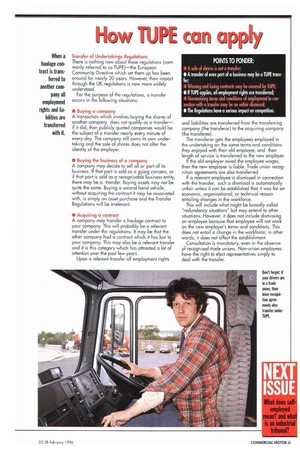How RIPE
Page 53

If you've noticed an error in this article please click here to report it so we can fix it.
can appl
Transfer of Undertakings Regulations There is nothing new about these regulations (commonly referred to as TUPE)—the European Community Directive which set them up has been around for nearly 20 years. However, their impact through the UK regulations is now more widely understood.
For the purpose of the regulations, a transfer occurs in the following situations:
• Buying a company
A transaction which involves buying the shares of another company does not qualify as a transfer— if it did, then publicly quoted companies would be the subject of a transfer nearly every minute of every ay. The company still owns its own undertaking and the sale of shares does not alter the identity of the employer.
• Buying the business of a company
A company may decide to sell all or part of its business. It that part is sold as a going concern, or if that part is sold as a recognisable business entity, there may be a transfer. Buying assets may not be quite the same. Buying a second hand vehicle, without acquiring the contract it may be associated with, is simply an asset purchase and the Transfer Regulations will be irrelevant.
• Acquiring a contract
A company may transfer a haulage contract to your company. This will probably bea relevant transfer under the regulations. It may be that the other company had a contract which it has lost to your company. This may also be a relevant transfer and it is this category which has attracted a lot of attention over the past few years. Upon a relevant transfer all employment rights
and iabilities are transferred from the transferring company (the transferor) to the acquiring company (the transferee).
The transferor gets the employees employed in the undertaking on the same terms and conditions they enjoyed with their old employer, and their length of service is transferred to the new employer.
IFthe old employer owed the employee wages, then the new employer is liable. Trade union recognition agreements are also transferred. If a relevant employee is dismissed in connection with the transfer, such a dismissal is automatically unfair unless it can be established that it was for an economic, organisational, or technical reason entailing changes in the workforce. This will include what might be broadly called "redundancy situations" but may extend to other situations. However, it does not include dismissing an employee because that employee will not work on the new employer's terms and conditions. This does not entail a change in the workforce; in other words, it does not affect the establishment.
Consultation is mandatory, even in the absence of recognised trade unions. Non-union employees have the right to elect representatives simply to deal with the transfer.




































































































